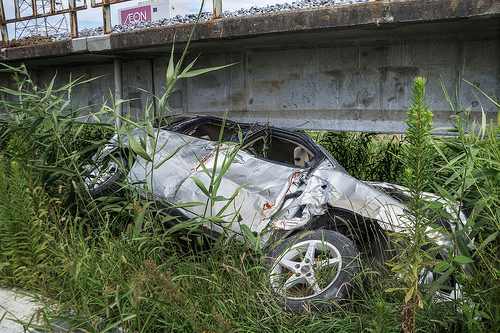
Photo credit: Yuya Sekiguchi
“EU to bug every car in UK with tracker chips – and Ministers admit they are powerless to stop the Big Brother technology” screams the headline in the Daily Mail.
Under EU plans, every new car sold in Europe from October next year would have a ‘black box’ device, containing a phone-like SIM card, designed to help emergency services get to vehicles quickly in the event of crash.
Already fitted in vehicles from BMW and Volvo, the ‘eCall’ service uses an SOS button near the dashboard, linked to a SIM card, which allows drivers to call emergency services quickly, and provide the exact location of the call. If airbags are deployed in the vehicle, then eCall automatically sends a text message to emergency services with the car’s location – as well as its unique vehicle ID number.
Voluntary take-up has been low across the industry, and according to the EU web site “a small minority of EU countries have been slow to support eCall” so the EU ruled all new car models must include eCall from October 1, 2015. Motorists will be unable to switch it off, and the device will be tested in MoT checks. eCall should also inter-operate with a similar Russian system if driving in the Russian Federation, and be available in EEA countries Iceland, Norway and Switzerland.
The EU Parliament voted it through last month and a draft of the law is due to be published next week before it is agreed by the EU Commission. The cost of the devices is estimated by the UK government to be around £100 per vehicle, and EU information suggests that response times could improve by 50 to 60%, with a consequent reduction in fatalities and severity of injuries. Road traffic accidents cost the EU around €160 billion/ year, but they estimate that if all cars were equipped with the eCall system, up to €20 billion could be saved annually.
Criticism regarding costs and privacy
According to the Daily Mail, official correspondence they have seen from the Department of Transport shows the UK’s opposition to the policy. Transport Minister Robert Goodwill claims the costs of the device to Britain ‘outweigh the benefits’.
‘Unfortunately, there is very little support for the UK position and no possibility of blocking this legislation. We are working with other member states to minimise the potential burdens on manufacturers and the potential cost to consumers.
‘With regard to the rules on privacy and data protection, other member states have expressed similar concerns to us, about the potential for constant tracking of vehicles via the eCall system.’
Emma Carr, of civil liberties group Big Brother Watch, said: ‘Motorists will not be comfortable forcibly having a black box installed which is capable of recording and transmitting their exact location when they are driving.’
Telematics systems already allow monitoring of the behaviour, speeds and driving styles of drivers, and fears have been voiced that data gathered by the devices could be shared with insurers and recovery firms. However, eCall normally ‘sleeps’, and does not allow vehicle tracking outside emergencies, unlike Telematics devices which provide constant monitoring to provide insurers and fleet owners with data on low-risk or high-risk behaviour, and are used to educate poor drivers, or even reward safer drivers with lower premiums.
What’s your view?
I take the view that this technology is highly beneficial – if you’re unconscious, bleeding and upside down in an isolated Provence drainage ditch, and the petrol is slowly trickling around your head, the enhanced response time of emergency services who would know you’d had a serious accident, know exactly where you are, and what vehicle you’re in, could certainly save your life. I’d be happy to invest an extra £100 to have that technology in place.
